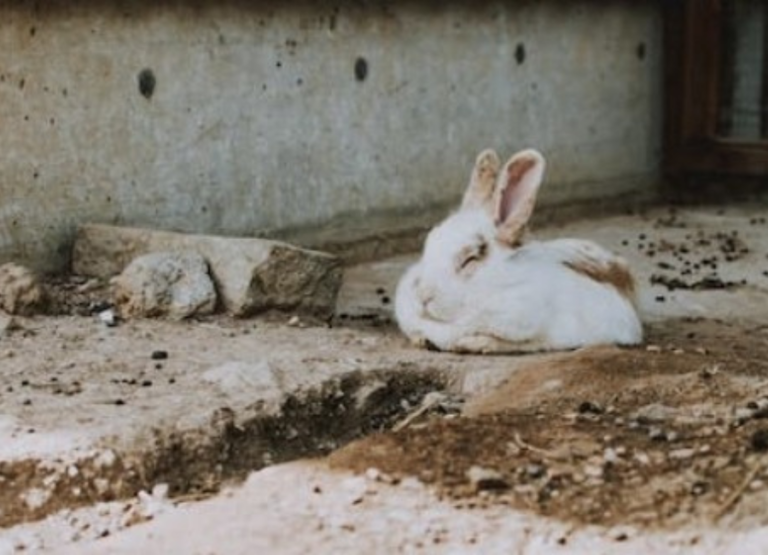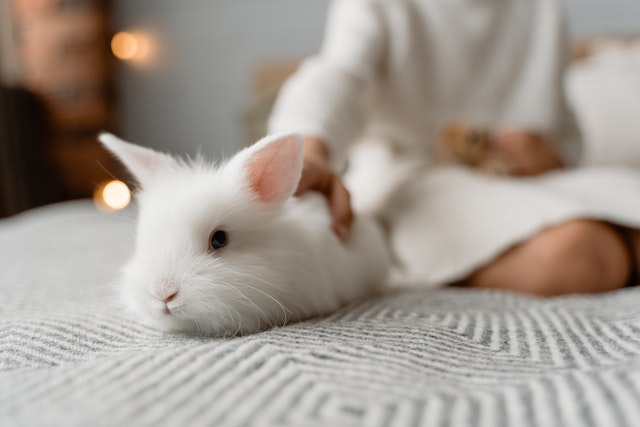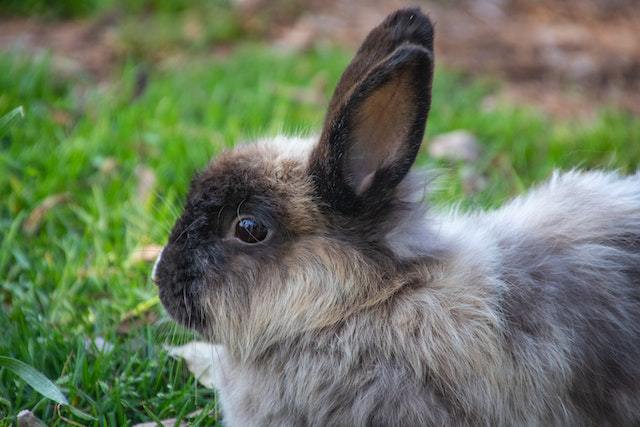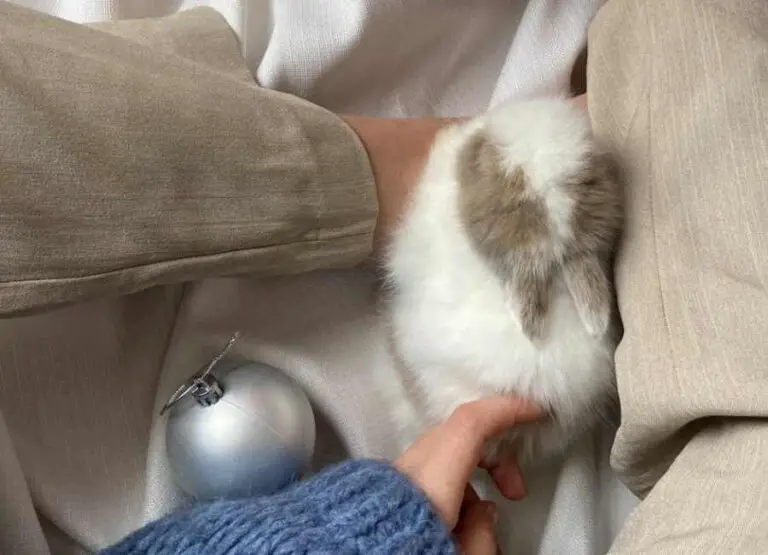12 Common Signs Your Rabbit Is Dying [Comfort Them]
![12 Common Signs Your Rabbit Is Dying [Comfort Them] Signs Your Rabbit is Dying](https://petcreeks.com/wp-content/uploads/2023/10/rabbit-905971_640.jpg)
Let’s discuss the signs your rabbit is dying…
Today, we’re going to talk about a topic that’s important but not often easy to discuss: “Signs Your Rabbit is Dying.”
In this article, we’ll explore the subtle signs that may indicate your rabbit is in distress or nearing the end of their journey.
Signs Your Rabbit Is Dying
Signs that indicate a rabbit may be nearing the end of its life include a significant decrease in appetite, lethargy, difficulty breathing, and a decline in overall mobility.
Additionally, rabbits may exhibit symptoms such as weight loss, diarrhea, and a lack of grooming.
If you notice these signs in your rabbit, it is important to seek veterinary care as soon as possible to determine the best course of action and provide comfort to your furry friend during this difficult time.
Let’s dive deeper…
The following are some of the most common signs your rabbit is dying:
1. Extreme Body Temperature Changes
One sign that your rabbit may be dying is extreme body temperature changes. This can manifest as either hypothermia (low body temperature) or hyperthermia (high body temperature).
Hypothermia can occur if your rabbit is not able to regulate its body temperature properly, which can be a sign of a serious underlying health issue. Hyperthermia, on the other hand, can be a sign of heat stroke or fever.
What to do:
- If your rabbit is experiencing hypothermia, you can try to warm them up slowly by providing a warm environment and using blankets or heating pads. However, it is important to avoid overheating them, as this can be dangerous.
- If your rabbit is experiencing hyperthermia, you should try to cool them down gradually by providing a cooler environment and offering them water to drink. You can also use a damp cloth to gently cool their body.
2. Difficulty Breathing
Another sign that your rabbit may be dying is difficulty breathing. This can manifest as rapid, shallow breathing, wheezing, or gasping for breath. Difficulty breathing can be a sign of respiratory issues or heart problems, which can be life-threatening for rabbits.
What to do:
- If your rabbit is having difficulty breathing, it is important to seek veterinary attention immediately. Respiratory issues can quickly become serious in rabbits, and prompt medical intervention is crucial.
- While waiting for veterinary care, you can try to keep your rabbit calm and comfortable. Avoid stressing them further by handling them unnecessarily or exposing them to extreme temperatures.
3. Lethargy and Weakness
Lethargy and weakness are common signs of illness or distress in rabbits. If your rabbit is not moving much, seems weak, or is unable to stand or walk properly, it may be a sign that they are nearing the end of their life.
What to do:
- If your rabbit is showing signs of lethargy and weakness, it is important to provide them with a comfortable and quiet environment. Make sure they have access to fresh water and food but do not force them to eat or drink if they are not interested.
- It is recommended to consult with a veterinarian to determine the underlying cause of your rabbit’s condition and to discuss the best course of action.
4. Change in Eating Habits
A significant change in your rabbit’s eating habits can also be a sign that they are dying. This can manifest as a loss of appetite, refusal to eat, or difficulty chewing or swallowing.
What to do:
- If your rabbit is not eating, it is important to consult with a veterinarian. Loss of appetite can be a sign of various health issues, and it is crucial to determine the underlying cause and provide appropriate treatment.
- In the meantime, you can try offering your rabbit a variety of fresh and enticing foods to encourage them to eat. Softening their food or providing hay pellets may also help if they are having difficulty chewing or swallowing.
5. Significant Drop in Your Rabbit’s Weight
One of the signs that your rabbit may be dying is a significant drop in weight.
If you notice that your rabbit is losing weight rapidly and becoming noticeably thinner, it could be an indication of an underlying health issue or a decline in their overall health.
Weight loss can be caused by various factors, such as dental problems, gastrointestinal issues, or organ failure.
What to do:
- Monitor your rabbit’s weight regularly to track any changes.
- Consult a veterinarian as soon as possible to determine the cause of the weight loss.
- Follow the veterinarian’s advice regarding any necessary treatments or dietary adjustments.
- Provide your rabbit with a balanced and nutritious diet to support their overall health.
6. Increasing Inactivity
Another sign that your rabbit may be dying is a noticeable increase in inactivity.
If your rabbit becomes less active, spends more time lying down, or shows a lack of interest in their usual activities, it could be a sign of declining health.
Rabbits are typically active and curious animals, so a significant decrease in activity levels can be concerning.
What to do:
- Observe your rabbit’s behavior closely and note any changes in activity levels.
- Ensure that your rabbit has a comfortable and stress-free environment.
- Provide your rabbit with a quiet and peaceful space to rest.
- Consult a veterinarian to determine the underlying cause of the increased inactivity.
7. Chronic Digestive Problems
Chronic digestive problems can be a sign that your rabbit is dying. If your rabbit experiences ongoing issues with their digestive system, such as diarrhea, constipation, or a loss of appetite, it can indicate a serious health condition.
Digestive problems can lead to dehydration, malnutrition, and overall weakness in rabbits.
What to do:
- Seek veterinary attention if your rabbit experiences chronic digestive problems.
- Follow the veterinarian’s advice regarding any necessary treatments or dietary changes.
- Ensure that your rabbit has access to fresh water at all times to prevent dehydration.
- Provide your rabbit with a high-fiber diet to support their digestive health.
8. Eyes and Nose Discharge
The presence of discharge from the eyes and nose can be a sign that your rabbit is dying.
If you notice excessive or abnormal discharge from your rabbit’s eyes or nose, it could indicate an underlying respiratory infection or other health issues.
Discharge can be accompanied by other symptoms such as sneezing, coughing, or difficulty breathing.
What to do:
- Consult a veterinarian if you observe abnormal discharge from your rabbit’s eyes or nose.
- Follow the veterinarian’s advice regarding any necessary treatments or medications.
- Keep your rabbit’s living environment clean and free from potential irritants.
- Provide your rabbit with proper ventilation and avoid exposing them to extreme temperatures.
9. Significant Dehydration
One of the signs that your rabbit may be dying is significant dehydration. Dehydration can occur due to various reasons, such as illness, lack of access to water, or decreased water intake. Some signs of dehydration in rabbits include:
- Dry and sticky gums
- Sunken eyes
- Loss of skin elasticity
- Reduced or no urine output
- Lethargy and weakness
What to do:
If you suspect that your rabbit is dehydrated, it is important to take immediate action. Here are some steps you can take to help your dying rabbit:
- Offer water: Ensure that your rabbit has access to fresh water at all times. You can try offering water in a shallow dish or using a water bottle attached to the cage. If your rabbit is unable to drink on its own, you may need to syringe-feed water to prevent further dehydration.
- Consult a veterinarian: It is crucial to seek veterinary care as soon as possible. A veterinarian can assess your rabbit’s condition and provide appropriate treatment, such as intravenous fluids, to rehydrate your rabbit.
- Monitor closely: Keep a close eye on your rabbit’s hydration status and overall condition. If there is no improvement or if the dehydration worsens, contact your veterinarian immediately.
10. Unexplained Hair Loss
Hair loss in rabbits can be a sign of various health issues, including underlying diseases or stress.
However, unexplained hair loss can also be an indication that your rabbit is nearing the end of its life. Some signs of hair loss in rabbits include:
- Patchy or uneven fur
- Bald spots
- Excessive shedding
What to do:
If your rabbit is experiencing unexplained hair loss, it is important to address any underlying health issues and provide comfort during this time. Here are some steps you can take to help your dying rabbit:
- Veterinary examination: Schedule a visit to the veterinarian to determine the cause of the hair loss. The vet can provide appropriate treatment or suggest ways to manage the condition.
- Provide a comfortable environment: Ensure that your rabbit has a clean and comfortable living space. Provide soft bedding and a warm area for your rabbit to rest.
- Gentle grooming: If your rabbit’s hair loss is causing discomfort, you can gently groom your rabbit to remove loose fur and prevent matting. Use a soft brush or comb to avoid causing any pain or stress.
- Monitor closely: Keep a close eye on your rabbit’s overall condition and behavior. If there are any significant changes or if the hair loss worsens, consult your veterinarian for further guidance.
11. Changes in Urine or Feces
Changes in urine or feces can be indicative of underlying health issues in rabbits. These changes can include alterations in color, consistency, or frequency. Some signs of changes in urine or feces in rabbits include:
- Blood in urine or feces
- Diarrhea or soft stools
- Decreased or increased urine output
- Straining or difficulty urinating or defecating
What to do:
If you notice any changes in your rabbit’s urine or feces, it is important to address the issue promptly. Here are some steps you can take to help your dying rabbit:
- Veterinary examination: Schedule a visit to the veterinarian to determine the cause of the changes. The vet can perform tests, such as a urinalysis or fecal examination, to diagnose any underlying conditions and provide appropriate treatment.
- Dietary adjustments: Follow your veterinarian’s recommendations regarding diet and nutrition. They may suggest changes in the rabbit’s diet to address the specific issue.
- Provide a clean environment: Ensure that your rabbit’s living space is clean and hygienic. Regularly clean the litter box and provide fresh bedding to prevent any further complications.
- Monitor closely: Keep a close eye on your rabbit’s urinary and fecal habits. If there are any significant changes or if the condition worsens, consult your veterinarian for further guidance.
12. Sudden Behavior Changes
Sudden behavior changes in rabbits can be a sign of underlying health issues or distress. These changes can include alterations in activity level, appetite, or social behavior. Some signs of sudden behavior changes in rabbits include:
- Lethargy or decreased activity
- Loss of appetite or refusal to eat
- Aggression or irritability
- Hiding or withdrawing from social interaction
What to do:
If your rabbit is experiencing sudden behavior changes, it is important to address any underlying issues and provide comfort during this time. Here are some steps you can take to help your dying rabbit:
- Veterinary examination: Schedule a visit to the veterinarian to determine the cause of the behavior changes. The vet can assess your rabbit’s overall health and provide appropriate treatment or guidance.
- Provide a calm and quiet environment: Create a peaceful environment for your rabbit by minimizing noise and disturbances. Ensure that your rabbit has a comfortable and secure space to rest.
- Offer favorite foods: Encourage your rabbit to eat by offering its favorite foods. If your rabbit is refusing to eat, consult your veterinarian for guidance on alternative feeding methods.
- Monitor closely: Keep a close eye on your rabbit’s behavior and overall condition. If there are any significant changes or if the behavior worsens, consult your veterinarian for further guidance.
How to Comfort Your Dying Rabbit
Comforting a dying rabbit requires a compassionate and gentle approach. Here are some ways to provide comfort to your dying rabbit:
Create a calm and quiet environment: Find a quiet and peaceful area where your rabbit can rest comfortably. Minimize noise and disturbances to create a soothing atmosphere.
Provide a comfortable resting place: Ensure that your rabbit has a soft and cozy bed or blanket to lie on. This will help provide physical comfort during their final moments.
Offer gentle physical contact: Rabbits can find comfort in gentle touch. You can stroke your rabbit’s fur or hold them gently if they are comfortable with it. Be mindful of their body language and only provide physical contact if they seem receptive to it.
Maintain a familiar routine: Stick to your rabbit’s regular routine as much as possible. This can help provide a sense of security and familiarity during their final days.
Monitor their comfort and pain levels: Pay close attention to your rabbit’s behavior and body language. Look for signs of pain or discomfort, such as decreased appetite, difficulty breathing, or changes in mobility. Consult with a veterinarian to ensure your rabbit’s comfort and manage any pain effectively.
Provide emotional support: Spend time with your rabbit, talking to them in a soothing voice and offering gentle reassurance. Your presence can provide comfort and companionship during their final moments.
Consider palliative care: If appropriate, consult with a veterinarian about palliative care options for your rabbit. This may include pain management medications or other supportive measures to improve their quality of life during their final days.
Seek professional guidance: It is important to consult with a veterinarian who specializes in rabbit care. They can provide guidance on managing your rabbit’s comfort, pain, and overall well-being during this difficult time.
Read more about the signs your rabbit is sick.
Frequently Asked Questions
How can I tell if my rabbit is dying?
There are several signs that may indicate your rabbit is nearing the end of its life. These can include loss of appetite, difficulty breathing, lethargy, unresponsiveness, and a significant decline in overall health.
What are some physical signs that my rabbit is in distress?
Physical signs of distress in a dying rabbit may include weight loss, hunched posture, labored breathing, discolored urine or feces, and a lack of grooming.
Is it normal for a rabbit to stop eating before it passes away?
Yes, it is common for rabbits to lose their appetite as they near the end of their life. This can be due to a variety of factors, including pain, organ failure, or overall weakness.
What can I do to make my dying rabbit more comfortable?
Providing a quiet and calm environment is crucial for a dying rabbit. Make sure they have a warm and cozy spot to rest, access to fresh water, and gentle handling. Consulting with a veterinarian for pain management options can also help ease their discomfort.
Should I consider euthanasia for my dying rabbit?
Euthanasia is a personal decision that should be made in consultation with a veterinarian. If your rabbit is suffering and their quality of life is severely compromised, euthanasia may be the most humane option to prevent further pain and distress.
How can I cope with the loss of my rabbit?
Losing a beloved pet can be incredibly difficult. It’s important to give yourself time to grieve and lean on the support of friends and family. Remembering the happy moments you shared with your rabbit and honoring their memory in a meaningful way can also help with the healing process.
Read more about health problems in rabbits.
Conclusion
In conclusion, it’s important to be aware of the signs that your rabbit may be nearing the end of its life.
By observing changes in appetite, behavior, and physical condition, you can provide the necessary care and comfort during this difficult time.
Remember, seeking veterinary advice and support is crucial to ensure your rabbit’s well-being.



![12 Abnormal Rabbit Behaviour [Meaning & Tips] Abnormal Rabbit Behaviour](https://petcreeks.com/wp-content/uploads/2023/10/pexels-magda-ehlers-9348913.jpg)

![How to Comfort a Dying Rabbit [12 Helpful Strategies] How to Comfort a Dying Rabbit](https://petcreeks.com/wp-content/uploads/2023/10/How-to-Comfort-a-Dying-Rabbit.jpg)
